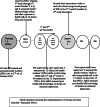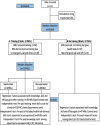The effect of training and supervision on primary health care workers' competence to deliver maternal depression inclusive health education in Ibadan, Nigeria: a quasi-experimental study
- PMID: 34847938
- PMCID: PMC8630868
- DOI: 10.1186/s12913-021-07208-3
The effect of training and supervision on primary health care workers' competence to deliver maternal depression inclusive health education in Ibadan, Nigeria: a quasi-experimental study
Abstract
Background: Health workers lack the competence to address maternal depression in the routine health education in Nigeria. Hence, awareness among maternal-child health clients is low. We assessed the effect of training and supervision on knowledge, skills, and self-efficacy of primary healthcare workers in delivering health talks and the clients' knowledge on maternal depression.
Methods: A quasi-experimental study design was adopted. Five Local Government Area (LGAs) in the Ibadan metropolis were grouped according to geographical proximity and randomly assigned to experimental (Group A = two LGAs) and control (Group B = three LGAs) with 12 primary health centres in each group. All primary health care workers recruited in group A received a one-day training on maternal depression. Good Knowledge Gain (GKG), Good Skill Gain (GSG) and Self-Efficacy (SEG) were assessed in both groups. 1-week post-training, the knowledge of all the PHCs' attendees in the two groups was assessed. Two weeks post- training, a half of experimental group's PHCs received supportive supervision and a clinic-based health education delivery skill assessment was conducted. The knowledge of clients and their health seeking were also assessed. Fisher's exact test, independent t test and Poisson regression were used to analyze differences in percentages and mean/ factors associated with GKG, GSG and SE, using SPSS 25.
Results: Training improved gains in the experimental versus controls as follows: GKG (84.3% vs. 15.7%), GSG (90.7% vs 9.3%) and SEG (100% vs 0%). Training contributed to the good gain in knowledge (RR = 6.03; 95%CI =2.44-16.46; p < 0.01); skill (RR = 1.88; CI = 1.53-2.33; p < 0.01).) and self-efficacy (RR = 2.74; CI = 2.07-2.73; p < 0.01). Clients in the experimental group had higher knowledge gain score than in the control (7.10 ± 2.4 versus - 0.45 ± 2.37); p < 0.01). The rater supervisor observed better motivation in the supervised group than the not supervised. Forty clients sought help in the intervention group while none in the control group. Thirty-five clients sought help in the supervised group while only five did in the not supervised.
Conclusions: Training followed by supervision improved the competence of health workers to transfer knowledge to clients. This intervention is recommended for primary healthcare settings to improve uptake of maternal mental health services.
Keywords: Competence; Educational materials; Implementation; Maternal depression; Primary health care workers; Supervision; Training.
© 2021. The Author(s).
Conflict of interest statement
All authors declared that no conflict of interest is attached to this study.
Figures
References
-
- Friedrich MJ. Depression is the leading cause of disability around the world. JAMA 2017;317(15):1517. [cited 2020 May 12]. Available from: 10.1001/jama.2017.3826 - PubMed
-
- Posmontier B, Horowitz JA. Postpartum practices and depression prevalences: technocentric and ethnokinship cultural perspectives. J Transcult Nurs 2004;15(1):34–43. [cited 2020 Mar 27]. Available from: 10.1177/1043659603260032 - PubMed
Publication types
MeSH terms
LinkOut - more resources
Full Text Sources
Medical




